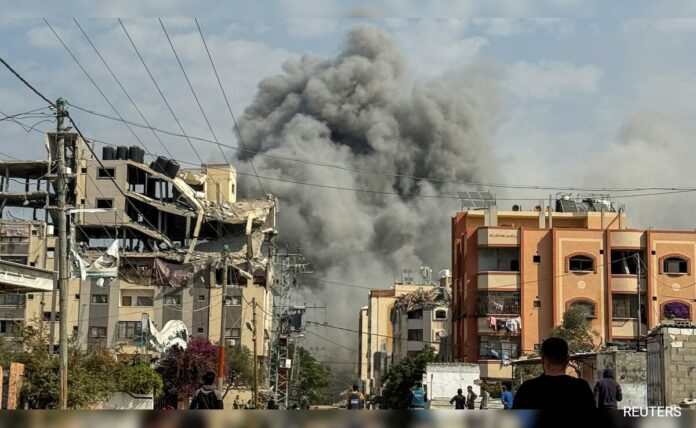The US has told Qatar that the presence of Hamas in Doha is no longer acceptable in the weeks since the Palestinian group rejected the latest proposal to achieve a ceasefire and a hostage deal, a senior administration official told Reuters on Friday.
The tiny Gulf state Qatar, alongside the US and Egypt, has played a major role in rounds of so-far fruitless talks to broker a ceasefire to the year-long war in Gaza. The latest round of talks in mid-October failed to produce a deal, with Hamas rejecting a short-term ceasefire proposal.
“After rejecting repeated proposals to release hostages, its leaders should no longer be welcome in the capitals of any American partner. We made that clear to Qatar following Hamas’s rejection weeks ago of another hostage release proposal,” the senior official said, speaking on the condition of anonymity.
Qatar then made the demand to Hamas leaders about 10 days ago, the official said. Washington has been in touch with Qatar over when to close the group’s political office, and it told Doha that now was the time.
Three Hamas officials denied Qatar had told Hamas leaders they were no longer welcome in the country. The spokesperson for Qatar’s foreign ministry did not immediately respond to a request for comment.
It was unclear if the Qataris provided a specific deadline to the Hamas leaders to leave the country.
President Joe Biden’s administration has been preparing to make a final push to end Israeli assaults in Gaza and Lebanon. Republican Donald Trump’s election this week as the next US president has significantly diminished Biden’s leverage during his last weeks in office.
In previous rounds of ceasefire talks, disagreements over new demands that Israel introduced about future military presence in Gaza obstructed a deal, even after Hamas accepted a version of a ceasefire proposal that Biden unveiled in May.
Hamas at the time viewed Israel as having moved the goal post for a deal “last-minute,” and worried any concessions it made would be met by more demands, a source close to the talks told Reuters in August.
Last November, this negotiation track in Doha led to a seven-day truce in Gaza, permitting the release of dozens of hostages held there in exchange for hundreds of Palestinian prisoners. Humanitarian aid also flowed into the shattered coastal strip but hostilities swiftly resumed and have continued ever since.
“END HOSPITALITY TO HAMAS”
Qatar, an influential Gulf state designated as a major non-NATO ally by Washington, has hosted Hamas’ political leaders since 2012 as part of an agreement with the US.
Following last year’s Oct. 7 attack on southern Israel, in which Hamas killed 1,200 people and abducted 250 others, US Secretary of State Antony Blinken told leaders in Qatar and elsewhere in the region that there could be “no more business as usual” with Hamas.
Qataris told Blinken they were open to reconsidering the presence of Hamas in the country when the time comes.
Israel’s retaliatory strikes on the Gaza Strip killed more than 43,000 Palestinians, reduced the enclave to a wasteland and unleashed a humanitarian catastrophe.
Doha has come under criticism from US lawmakers over its ties with the group.
On Friday, 14 Republican US senators wrote a letter to the Department of State asking Washington to immediately freeze the assets of Hamas officials living in Qatar, extradite several senior Hamas officials living in Qatar and ask Qatar “to end its hospitality to Hamas” senior leadership.”
Qatar’s Prime Minister Sheikh Mohammed bin Abdulrahman Al Thani has said repeatedly over the last year that the Hamas office exists in Doha to allow negotiations with the group and that as long as the channel remained useful Qatar would allow the Hamas office to remain open.
It is unclear how many Hamas officials live in Doha, but they include several leaders touted as possible replacements for leader Yahya Sinwar, whom Israeli forces killed in Gaza last month.
(Except for the headline, this story has not been edited by The Hindkesharistaff and is published from a syndicated feed.)




